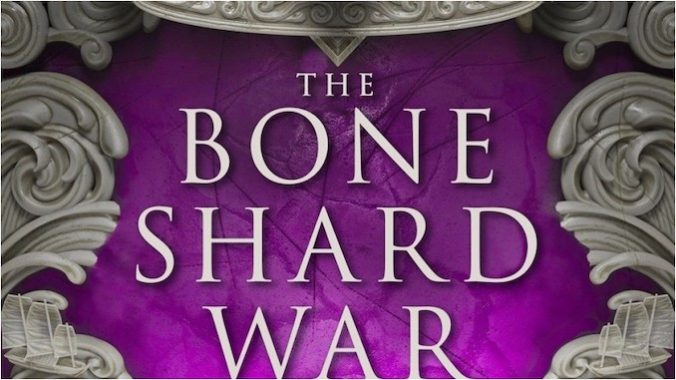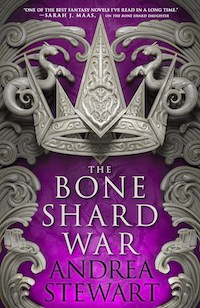The Bone Shard War Sends Andrea Stewart’s Drowning Empire Trilogy Off In Epic Style

Andrea Stewart is one of the most underrated fantasy authors writing today, and if you haven’t heard of her (truly excellent) Drowning Empire trilogy before, please consider this a plea to fix your life immediately. A rich, character-driven story about an island kingdom and the unique magical system based on literal human bone shards that both powers its advances and oppresses its citizens, Stewart’s series is captivating from its very first pages.
Final installment The Bone Shard War is an engrossing, thrilling series conclusion, one that’s as full of thoughtful character dynamics and interpersonal growth as it is sweeping carefully plotted battle sequences. Though it runs for over six hundred pages, its energy is quick and propulsive, full of narrative twists and turns that will leave readers guessing not just about who will be the ultimate victors in the war for control of the Phoenix Empire, but what “winning” such a war truly means.

Stewart’s characters remain three-dimensional and rich as ever, frequently torn between love, duty, anger, and revenge (and sometimes all at once!). But where this novel truly shines is in its worldbuilding, as the pieces of hundreds of pages of lore come together in shockingly perfect ways. From the origins of the creatures called ossalen to the true history of the magical beings known as Alanga and their relationships with humans, revelations unfurl that have clearly been building for hundreds of pages, hiding in plain sight all along.
Two years have passed since the events of The Bone Shard Emperor, which means that the brewing rebellion from the Shardless Few has had some time to really spread and take hold across the empire. Emperor Lin Sukai, who is both an Alanga and a construct powered by bone shard magic meant to look human, is doing her best to hold the fracturing pieces of her kingdom together even as she faces mistrust and unrest from many of her people. A continued pause on the mining of whitstone means the material—which powers most forms of transport—has left trade between the empire’s islands diminished and a disease called bog cough spreads among the populace, with limited access (or ability to transport) the specific nut that provides the cure.
-

-

-

-

-

-

-

-

-

-

-

-

-

-

-

-

-

-

-

-

-

-

-

-

-

-

-

-

-

-

-

-

-

-

-

-

-

-

-

-








































